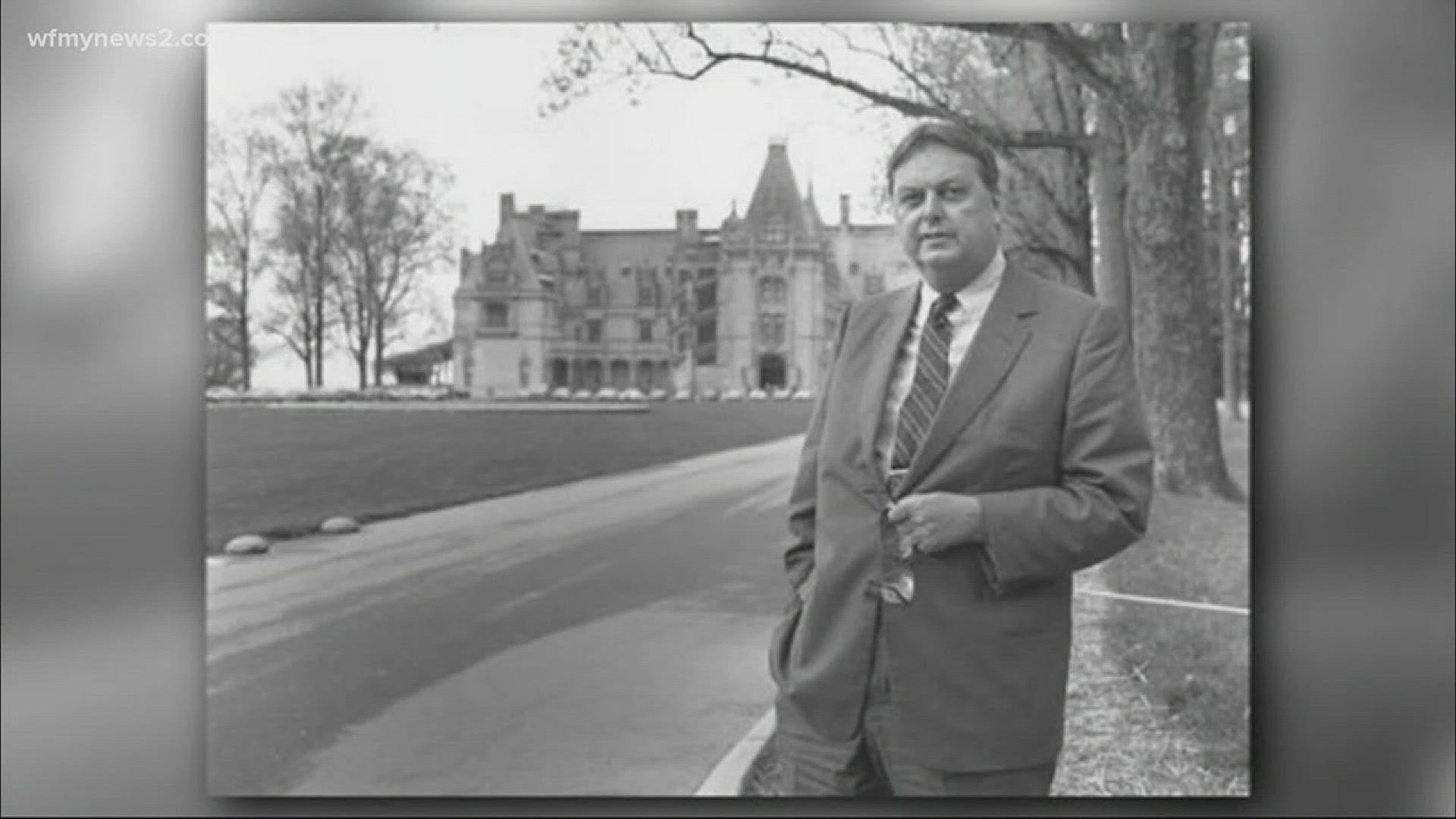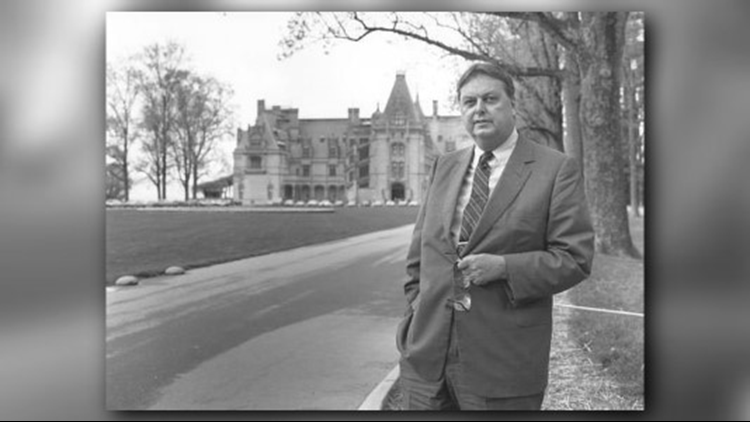William Amherst Vanderbilt Cecil, owner of the Biltmore Estate and a champion of its preservation and success, died at his Asheville home Tuesday.
Cecil also was the grandson of the estate's famous builder, George Washington Vanderbilt III. Cecil was 89.
“My father’s legacy is immeasurable for our family,” Bill Cecil Jr., William Cecil’s son and president & CEO of the Biltmore Company, which owns and operates Biltmore Estate, said in a press release. “He will always be remembered for his leadership, vision and dedication to Biltmore. He had the foresight to do what everyone thought was impossible."
Biltmore Estates Owner Dies At His Home In NC
Cecil said his father devoted himself to the estate's preservation, and he was determined to make the estate self-supporting. The 8,000-acre estate, French-style chateau and on-site attractions such as the Antler Hill Village retail area and a winery now host more than 1.4 million tourists annually, but during the mid-20th century the estate struggled financially.
Born Aug. 17, 1928, at his family home in Asheville, William A.V. Cecil was the youngest son of Cornelia Vanderbilt Cecil and John Francis Amherst Cecil. He was educated in England and Switzerland, then served in the British Navy near the end of World War II.
After graduating from Harvard University in 1952, Cecil worked in finance at Chase Manhattan Bank in Washington, D.C., and with Chase’s international department in New York.
In 1957, Cecil married Mary “Mimi” Ryan, a lawyer with a Wall Street firm. Three years later they moved from New York to Asheville, determined to preserve Biltmore by boosting tourism, not only to the estate but also to the Asheville region.
George Vanderbilt completed the estate in 1895, but he died in 1914 in Washington, D.C. from complications after an appendectomy.
While William A.V. Cecil's parents had opened the Biltmore house to the public in 1930, it was not a money-maker. A 2016 Citizen-Times story noted the estate turned its first profit in 1969, a decade after Mimi and William Cecil returned to Asheville.
It was not quite $17.
"My dad was very proud of that," Bill Cecil said with a smile at the time.
In its press release, the Biltmore Co. said Cecil's leadership "propelled restorations to Biltmore House, renovations across the estate, and unparalleled growth for the Biltmore Company based on his unique business philosophy of a profitable private enterprise supporting preservation."
He would do anything for the company, including taking pictures and writing marketing copy.
His devotion to the estate was unquestioned, and it was never about bringing in huge profits. In its press release, the Biltmore Co. cited an oft-repeated quote of the elder Cecil: “We don’t preserve Biltmore to make a profit. We make a profit to preserve Biltmore."
Steve Miller, 62, worked for the Biltmore Company for 38 years, starting in college when he would literally muck out livestock stalls. He considers Cecil one of the "great men" of Asheville, a true gentleman and visionary who did not seek out the spotlight but was quietly instrumental in the progress of the estate, and the region.
While the estate is flooded with tourists almost year-round now, it's easy to forget that in the middle of the last century the estate was losing $250,000 a year, Miller said. The famous Biltmore Dairy was self-sufficient, but overall, taxes and operating costs siphoned off more money than the estate could generate.
Despite industry experts who told him he could never turn a profit on a historic property, Cecil persevered, determined not only to succeed but also to keep the estate privately owned. It is the largest privately owned home in America.
"He recognized the potential for Biltmore — and Asheville — to become really significant national tourism destinations," said Miller, who now owns a consulting business and teaches business at UNC Chapel Hill. "Had it not been for his foresight and his determination, Biltmore would not be what it is today, and I don’t think Asheville would be what it is its today."
Miller said when he started working at Biltmore in the mid-1970s, the estate had about 100 employees. Now that number is over 2,400, depending on the season.
Miller left Biltmore in 2011 as vice chairman of the executive committee and an executive vice president. While William's Cecil's successes were many, Miller considers his most significant achievements the estate's ability to become self-sufficient, and the opening of the Biltmore Winery in 1985.
"He was absolutely committed to leaving Biltmore in better condition for next generation than the condition he found it in," Miller said, adding that the notion of stewardship was central to Cecil's philosophy. "He believed it was every generation’s responsibility to do that."
Had Cecil remained in the high-finance world or opted to make a short-term profit by selling off estate lands, the Asheville area would have been forever diminished, MIller said. Cecil was the kind of entrepreneur, "that if you told him he couldn't do something, that was exactly what he was going to try to do."
"It's a wonderful story for our community," Miller said. "Not many communities are lucky enough to have had somebody like that."
The Biltmore Co. noted in the book, "Lady on the Hill," laid out some of the challenges William Cecil faced in restoring Biltmore to its early-20th century grandeur.
“There was this negativism that it can’t be done,” Cecil said in the book. “If you ever want me to do something, just say ‘It can’t be done.’ Everyone told me it couldn’t be done, so I just stuck my feet in it and I said, ‘We’ll see about that.’ And that is what motivated me.”
The 250-room Biltmore Estate was designated a National Historic Landmark in 1963.
“Biltmore was always very close to his heart,” Dini Pickering, William A.V. Cecil’s daughter and president of the Family Office, and vice chair of the board of directors, said in the press release. “He dedicated his life to ensuring that Biltmore would continue to be a treasure for future generations. He was very proud of his family and to see them carrying out his legacy gave him great joy.”
The elder Cecil retired from daily operations with the company in 1995, but he served as chairman of the Biltmore Compan's board of directors until his passing.
Cecil also worked tirelessly to bolster tourism in Western North Carolina, serving as president of the Asheville Area Chamber of Commerce and chairman of the Southern Highlands Attractions Association, among other organizations.
Marla Tambellini, deputy director and vice president of marketing for the Explore Asheville Convention & Visitors Bureau, worked for the Biltmore Estate from 1991-1994. She considers Cecil a major influence on her personally, but also on the larger tourism world.
"I truly don't think people understand how instrumental he was in shaping Asheville into the place it has become today," Tambellini said. "He poured his own profits into making Biltmore the iconic attraction it is today."
The Biltmore Estate and surrounding mountains continue to be "the primary reason visitors come here," Tambellini said, noting that the estate served "as a catalyst" for the resurgence of other areas, such as Asheville's downtown.
Cecil was a towering figure for the community, literally and figuratively, Tambellini said, alluding to his height and his keen vision for tourism as an economic driver.
"What he did at Biltmore and in his leadership in the community was really admirable, and it served as an inspiration for many tourism leaders in Asheville, North Carolina and even at the national level," she said.
That is one of the reasons the Buncombe County Tourism Development Authority established the William A.V. Cecil Award for Tourism Leadership in his honor nearly two decades ago.
Cecil is survived by his wife, Mary “Mimi” Ryan Cecil; his son, William A.V. “Bill” Cecil, Jr., and daughter-in-law Virginia “Ginger” Cecil; his daughter, Diana “Dini” Cecil Pickering, and son-in-law George “Chuck” Pickering; five grandchildren; and two great-grandchildren.
Cecil is also survived by his brother, George Henry Vanderbilt Cecil, 92, who headed the Biltmore Farms development company for decades. That company has developed commercial properties and neighborhoods, including Biltmore Park and Biltmore Lake.
In an afterword to "Lady on the Hill," William A.V. Cecil said he hoped the commitment to preserving "the great natural beauty that graces Biltmore is held sacred.
"The estate has given my family great personal and professional satisfaction over the years, and it has been my pleasure and my honor to share her," Cecil wrote. "Long may the Lady on the Hill stand as a symbol of vision, inspiration, and imagination.”
A private funeral for family, friends and close associates will take place at 11 a.m. on Friday, Nov. 3, at All Souls Cathedral in Biltmore Village, followed by a private family burial. A reception will follow 2-5 p.m. at Deerpark on Biltmore Estate.
In lieu of flowers, memorial donations may be made to the “Building Preservation Fund” at All Souls Cathedral, 9 Swan St., Asheville, North Carolina, 28803.
► Make it easy to keep up to date with more stories like this. Download the WFMY News 2 App now



